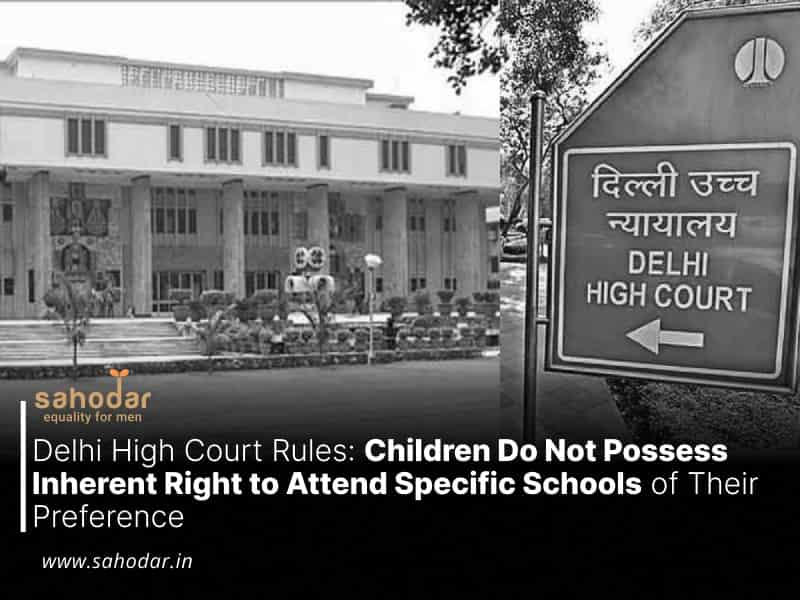The Delhi High Court determined that a child does not possess an inherent entitlement to receive education in a specific school of their choosing.
It emphasized that the entitlement outlined in Article 21A of the Constitution and Section 12 of the Right to Education Act, 2009 (RTE Act) solely guarantees free and compulsory education up to the age of 14, without specifying a particular institution for such education.
This decision was made in response to a writ petition filed by the mother of a 7.5-year-old girl against Maharaja Agrasen Model School.
A Single Bench of Justice C. Hari Shankar observed, “Absent such application, holding of a computerized draw of lots and shortlisting of a child for admission to a particular class in a particular school, no right to seek such admission enures in favour of the child. The right available under Article 21A of the Constitution or under Section 12 of the RTE Act is only to free and compulsory education till the age of fourteen, not for being provided such education in a particular school.”
The petitioner, Jiya, born in 2016, was approximately 7.5 years old. Hailing from the Economically Weaker Section (EWS) of society, her mother applied to the Directorate of Education (DoE) on her behalf for admission under the EWS category in Class I for the academic year 2022-23. Following a computerized draw conducted by the DoE, Jiya was selected for admission to the respondent school.
Despite repeated visits by her mother to the school, Jiya’s admission was denied by the respondent institution. Her mother subsequently approached the DoE, seeking its intervention to secure Jiya’s admission, but her efforts were unsuccessful. Therefore, Jiya, through her mother, filed a writ petition seeking a writ of mandamus to compel the school to admit her as an EWS student in Class II for the academic year 2023-24.
The High Court after hearing both sides noted, “No child, without her application suffering the rigour of this exercise, can directly claim a right to be admitted to a particular class in a particular school in a particular year as an EWS student. … The right guaranteed to every child under Article 21A of the Constitution or under the RTE Act is only for free and compulsory education till the age of fourteen. … That right would arise only if the child applies to the DoE as an EWS student for admission in the entry level class for that year and is shortlisted therefor, in the computerized draw of lots conducted by the DoE.”
Furthermore, the Court emphasized that the girl being deemed eligible for admission to Class I in the respondent school for the academic year 2022-23 by the Directorate of Education (DoE) does not automatically confer that right indefinitely into the future.
“Each year constitutes a fresh academic session. A child, who, for whatever reason, is unable to secure admission into a school as an EWS candidate despite having been shortlisted therefor by the DoE, and allows that academic year to pass without initiating any legal action in that regard, cannot claim, that on the basis of the said shortlisting, that she or he has an enforceable right to admission in that school for the next academic year to the next higher class. There is no such automatic carry forward of the right which enures in favour of the student, consequent to the draw of lots conducted by the DoE for a particular academic year, to the next academic year, in that class or in any higher class. Rights, it must be appreciated, extinguish with time”, it also observed.
The Court stated that the instruction from the Directorate of Education (DoE) in the email, directing the respondent school to enroll the girl on the same day, is neither legally valid nor enforceable.
“By 13 April 2023, the 2022-23 academic session had come to an end. With it, it must unfortunately be said, perished Jiya’s right to admission as an EWS student in the Respondent 2 school as well. Beyond that, Jiya’s right to education under the RTE Act, or under Article 21A of the Constitution, is only for being educated till the age of 14, and not for being educated specifically in the Respondent 2 school”, it added.
The Court observed that Section 32 solely permits individuals with grievances regarding a child’s rights under the RTE Act to submit a written complaint to the local authority
“I do not know whether the petitioner has made any such complaint. Assuming she, through her parent(s), has done so, the complaint would be dealt with in accordance with law. Section 32(1) cannot entitle Jiya to admission to Class II in the Respondent 2 school, for which she never approached the DoE in the first place, as an EWS student”, it added.
The Court noted that the application made for the academic year 2022-23, and the subsequent allocation of the petitioner to the respondent school through the computerized draw conducted by the Directorate of Education (DoE), has unfortunately become obsolete.
The Court concluded that neglecting to safeguard Jiya’s educational interests, as guaranteed by Section 12 of the RTE Act and Article 21A of the Constitution, would be contradictory. These provisions ensure Jiya’s right to education until the age of fourteen as an EWS student, and nothing beyond that.
“Jiya is not, therefore, entitled to admission to Class II in the Respondent 2 school as sought by her. The said prayer has therefore, necessarily to be rejected. … The DoE would, however, make every endeavour to ensure that Jiya is granted admission as an EWS student in Class II in some other school. This should be done as expeditiously as possible and, at any rate, within four weeks from the date of pronouncement”, it ordered.
Accordingly, the High Court disposed of the writ petition.

